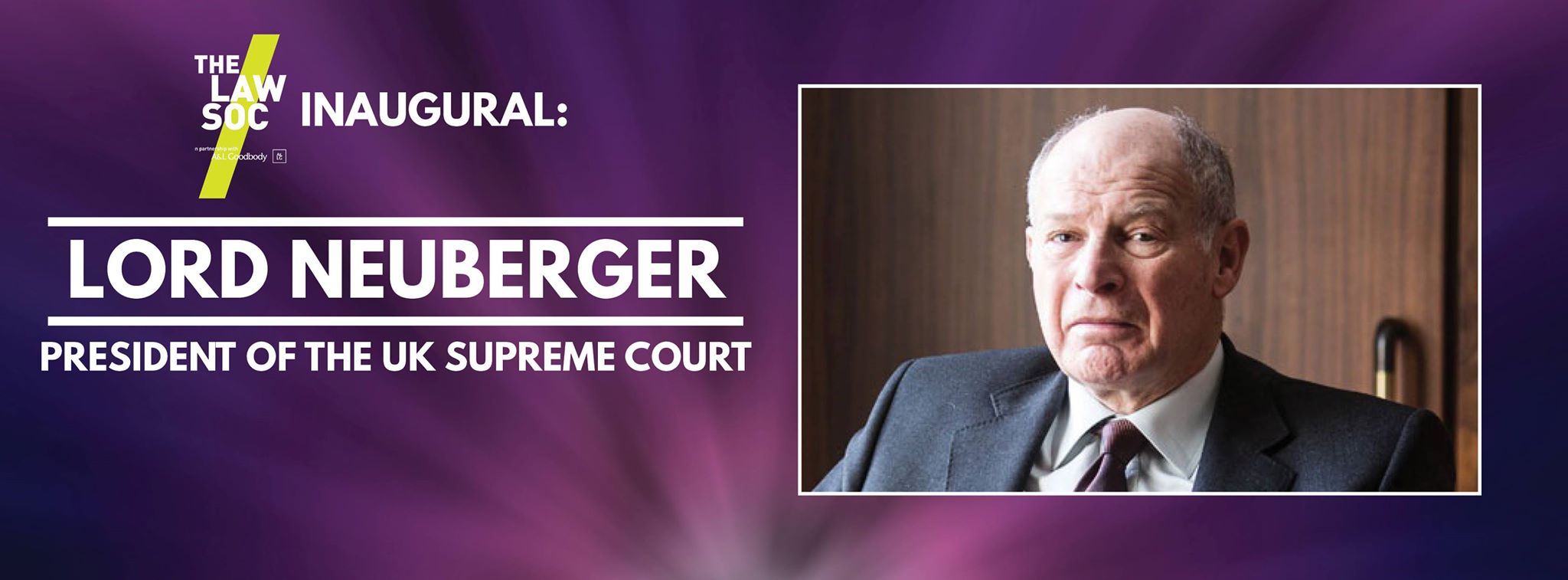 Last Friday, 6 March 2015, at 3pm, in Regent House, Trinity College Dublin, David Neuberger (Baron Neuberger of Abbotsbury), President of the UK Supreme Court, delivered the A&L Goodbody-sponsored Inaugural Address of the 81st Session of the Dublin University Law Society. His theme was the relationship between politics and law. There are photos from the event here.
Last Friday, 6 March 2015, at 3pm, in Regent House, Trinity College Dublin, David Neuberger (Baron Neuberger of Abbotsbury), President of the UK Supreme Court, delivered the A&L Goodbody-sponsored Inaugural Address of the 81st Session of the Dublin University Law Society. His theme was the relationship between politics and law. There are photos from the event here.
He began by saying that a highlight for him, last year, was to attend the State Banquet hosted by Her Majesty, Queen Elizabeth II at Windsor Castle for the State Visit to the UK of the President of Ireland, Michael D Higgins. Although relations between our two islands have not always been happy, we must never forget our shared history, for at least two reasons. First, we should be able to learn from the past, from mistakes and right decisions. Second, history is the context for present institutions and traditions. But even if we must never forget our history, we should never be its prisoners. Hence, for him, any change in the way in which we are governed, any change to the legislature, executive or judiciary, should harmonise with our current institutions and traditions. Innovators should be like new writers on a soap opera, adding new stories in the context of what has gone before (I pause parenthetically to observe that this reminds me of Ronald Dworkin’s theory in Law’s Empire of precedent as chain-novel, as an aspect of his more general theory of “law as integrity”). He observed that, in the UK, Parliament has manifested a tendency to produce too much legislation, much of which is badly drafted, and he spoke of the need for stability and continuity in the morass of change.
2015 is a year of centenaries: it is the 100th anniversary of Gallipoli, the 200th anniversary of Waterloo, the 600th anniversary of Agincourt, and the 800th anniversary of Magna Carta. It was signed in 1215, and in the following year, 1216, the Magna Carta Hiberniae (1 Hen 3) was issued for Ireland. The original was lost in the fire in the Four Courts in 1922. In the UK, all but three clauses of the Magna Carta have been repealed (though some have been re-enacted, in substance if not in form); but the Great Charter of Ireland is a Pre-Union Irish Statute retained in force by section 2(2)(a) of, and Schedule 1 to, the Statute Law Revision Act 2007 (also here). The story of Magna Carta illustrates an important theme about history: we may, in retrospect, see past events in a different light to how they were seen at the time; hence, Magna Carta was seen in one way in 1215 (as a short-term political settlement between the King and the Barons), but it has increasingly come to be given more importance, by Coke LCJ, by the US founding fathers, and as an inspiration for post-WWII human rights settlements.
Magna Carta is the foundation of the common law and human rights, which Ireland and the UK share. It was a game changer in politics and law. In politics, it was a deal between two power groups, the King and the Barons, brokered by a third group, the Church. But it did more than that. It made many changes to structures of government which persisted. In law, it was similarly transformative. But developments are illustrated by the famous clause 29 that there should beno imprisonment without lawful judgment, and justice should be neither sold nor delayed. But some things never change, such as the tension between political power and the rule of the law – clause 29 protected only “Freemen”.
There is still a real tension between democracy and the rule of law. They are the two pillars on which a modern free society rests. Politicians represent democracy; judges represent the rule of law. Politicians represent majorities; judges protect minorities (and, may I interject, individuals). Politicians are high profile, and it is of the essence of democracy that they can be removed by the people. Judges are law profile, and it is of the essence of the rule of law that they cannot be removed (except for good cause). Politicians answer questions from many quarters. Judges answer only one question. Politicians defend themselves on television in public. Judges write judgments. But for all of these differences, the aim of politicians and judges is still to support society, democracy and the rule of law.
The lecture concluded with an enlightening and wide-ranging question-and-answer session.
2 Reply to “Neuberger on politics and law”